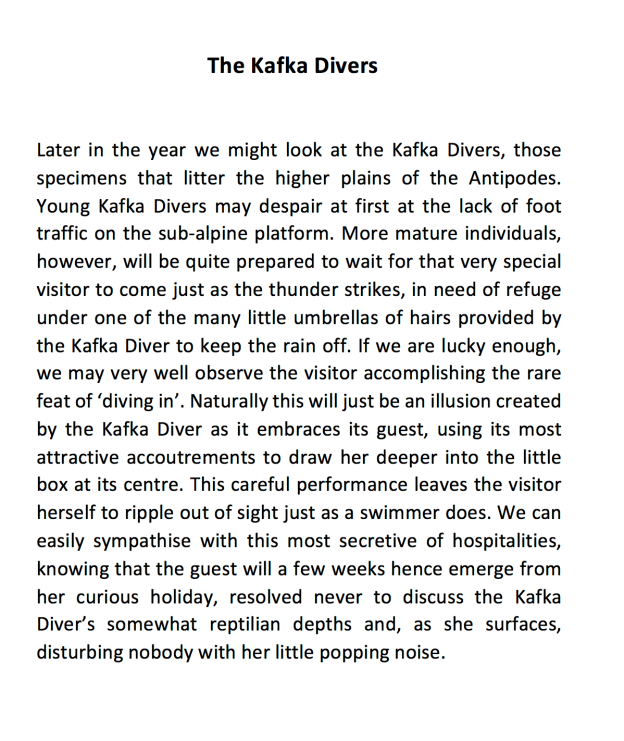
Note from Alison:
The Kafka Divers comes from One Human in Height, the debut collection by poet, artist and film-maker Rachel O’Neill. Published by Hue & Cry Press in 2013, the book contains a number of candidates for ‘classic poem’, including some that have been anthologised elswhere. I’ve chosen The Kafka Divers because I admire how much it fits into a small space, and because reading it always makes me smile.
The Kafka Divers is a prose poem – that deceptively simple form which is really a chameleon, with a sneaky ability to impersonate more apparently informational/straightforward kinds of prose. The poem’s style evokes taxonomy, a form of classificatory and descriptive writing associated with the natural sciences. It’s a genre with its own distinct language and way of looking at the world, which the author, who identifies as queer and non-binary, appropriates for her own purposes.
The poem invents a new thing – a plant called the Kafka Diver. At least it seems to be a plant, although it could be other things as well. A young person with a sense of isolation for instance, or even a poem that immerses its readers and draws them into its faintly ‘reptilian’ interior, an experience from which they will emerge after a period of time unscathed, if not unchanged.
I was curious about whether any particular model (field guide? botany lecture?) prompted The Kafka Divers, so I asked Rachel if she could comment on the poem’s origin. She replied that at the time she wrote it she was reading anthologies of nature, garden, and landscape writing published in the 1950s that she kept in her bathroom, and added:
‘In the anthology excerpts there is an exultation of the human longingly observing the non-human, yet the distinction between human and non-human collapses in the entanglement of gaze, mystery and desire, and in the tensions around whether order and/or chaos dictates attention and preference. I think The Kafka Divers taps into the whole mutual yet fragile (and potentially queer and erotic) performance of looking and being seen, bringing to the fore queer circuits of desire.’
In The Kafka Divers the potential for fascination to undermine the separation between observer and observed is figured as literal engulfment – the act of ‘diving in’. But a sense of ambiguous or permeable boundaries is also conveyed by the description of the Kafka Diver as a kind of hairy plant/umbrella/reptile assemblage, with a human (and very queer) capacity to succumb to loneliness/isolation, learn patience, or startle strangers with its singular appearance.
A similar ambiguity surrounds the roles of host and visitor, hospitality and predation, the description of ‘diving in’, which makes it unclear who (or perhaps both) or these actors is the ‘Diver’, and the relating of their encounter, with its alternating shocks of disappearing and emergence, creepiness and delight, horror and comedy.
You could argue that the coexistence of these contrasting emotional possibilities, whose resolution is left to the attention and preference of the reader, is signalled by the plant/poem’s title. After all, ‘Kafkaesque’ is a term we use to evoke the kind of bizarre and disturbing world in which a man might conceivably wake to discover he is an insect – the human subject turned, by a mysterious act of identification, into an ‘object’. But if the name ‘Kafka’ evokes a somewhat nightmarish state in which humans can lose their humanity or be subjected to inexplicable persecution, ‘Diver’ has connotations of commitment, courage, strength and grace. As Rachel comments,
‘I . . . set about to queer observational details and centred everything in Aotearoa, while still recruiting Kafka – though in the poem I question what might be perceived as Kafkaesque/nightmarish, so what ‘nightmarish’ might look like from a queer perspective.’
Read queerly, The Kafka Divers turns what might have been a horror tale of abduction in the sub-alpine zone of Aotearoa into a fable about the quiet or even ‘secretive’ triumph of connection over loneliness, hairiness, and a sub-prime position.
For me, another pleasure provided by the form the poem uses to explore issues of seeing and being seen is its reminder that histories of queer identifications (like those of other minorities) are entangled with the classifying gaze of science – whether sexology, medicine, psychiatry, or biology – approaches that have characteristically viewed queerness as, at best, a puzzle to be explained (‘gay gene’ anyone?) and at its most damaging, an aberration to be condemned or ‘cured’. In this sense the poem’s queering of perspective includes the suggestion that viewing human sexuality through the same set of field glasses used to study other species has the potential not only to reinforce stigma, but to open an Aladdin’s cave of specialisations and oddness, whose diversity and utopic potential remind me of Bruce Bagemihl’s concept of ‘biological exuberance’:
‘an affirmation of life’s vitality and infinite possibilities. . . at once primordial and furturistic; in which gender is kaleidoscopic, sexualities are multiple, and the categories of male and female are fluid . . A world, in short, exactly like the one we inhabit.’
References:
Bagemihl, Bruce: Biological Exuberance: animal homosexuality and natural diversity (1999) Profile Books, p 262.
O’Neill, Rachel: email
Alison Glenny’s Antarctic-themed collection of prose poems and fragments, The Farewell Tourist, was published by Otago University Press in 2018.
Rachel O’Neill (pronouns: she / her / hers / they / them / theirs) is a Pākehā Non-binary queer filmmaker, writer and artist who was raised in the Waikato and is now based in Te Whanganui-a-Tara, Aotearoa. Their debut book, One Human in Height (Hue & Cry Press) was published in 2013.
Hue & Cry Press author page






















